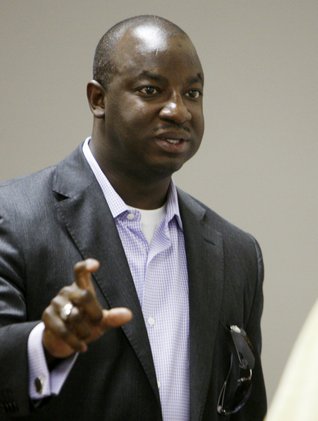
M. Christopher Brown II, dean of the UNLV College of Education, has resigned from his position. “I met with the provost this morning, and I don’t think we see a common vision of the college going forward,” Brown said on Tuesday afternoon.
Wednesday, June 3, 2009 | 2 a.m.
Sun Archives
- With colleges’ budget cuts final, what now? (6-2-2009)
- Faculty, professional staff shielded from furloughs (5-21-2009)
- Budget picture to clear as academic year ends (4-20-2009)
- Students face fee increase but aren't protesting (4-12-2009)
- Action on cuts waiting until lawmakers say how much (4-6-2009)
Sun Coverage
Beyond the Sun
The dean of UNLV’s College of Education has resigned.
M. Christopher Brown II’s last day on the job will be June 30. Administrators will name an interim dean and begin a search for a permanent successor when the university has the money to do so.
“I met with the provost this morning, and I don’t think we see a common vision of the college going forward,” Brown said on Tuesday afternoon.
Brown had sent a letter to College of Education employees last week informing them that he had decided to step down, but had second thoughts about his decision after many employees expressed support for him at a college meeting Monday.
Several of the 75 or so staff and faculty members present called for Brown to rescind his resignation.
Although some faculty members have criticized the dean’s leadership in private, Monday’s meeting was largely an outpouring of support for Brown.
At the start of the event, Brown told employees he had submitted his notice as a result of the college’s infighting. He said a small group of faculty members — “some of the most evil and mean-spirited people I have ever encountered” — had been making personal attacks against him, and that he just didn’t want to take it anymore.
Brown said one faculty member had made a racist comment to him that he did not want to repeat. And, Brown continued, a donor had recently reported hearing rumors that faculty members disliked the dean because he was a Republican. (Brown is a Democrat, but used to be a Republican.)
•••
In a June 2008 memo that Nevada’s public higher education chancellor distributed to legislators, the news media and others, UNLV Executive Vice President and Provost Neal Smatresk wrote, “THE IMPACT OF A 14% CUT ON UNLV’S PROGRAMS IS FATAL.”
The loss of classes and students “would begin a ‘death spiral’ of declining services and funding that could never be reversed,” Smatresk wrote. “Along the way UNLV’s research programs would cease, staff and faculty would leave and UNLV’s graduate program would decline by at least 50%.”
Now, instead of a 14 percent decrease in funding, UNLV is facing a 15.4 percent cut. And indeed, the university is suffering — administrators have reduced class offerings and eliminated or left open more than 360 jobs this year, including about 100 faculty positions.
But UNLV officials are no longer warning of a coming apocalypse. At a town-hall meeting last month, UNLV President David Ashley said in a packed auditorium that the university’s budget cut was “something we can deal with, and that’s the key message.”
•••
UNLV researchers have won more than $2.1 million from the Energy Department to lead four research projects related to nuclear technology. They represent steps in the right direction for a school working to establish a reputation for world-class research.
The projects deal with topics including nuclear waste separation technology and the disposal of nuclear waste.
The announcement last month of the awards brings more prestige to the university’s 5-year-old radiochemistry program, whose director, Ken Czerwinski, will serve as a principal investigator on three of the projects. He and colleagues competed against other researchers to win the Energy Department money.
At a time when state funding for higher education is shrinking, securing support from outside agencies is critical if UNLV is to continue pursuing its goal of becoming a nationally recognized research institution.
Often, a portion of grants and contracts from sources outside the university goes toward paying graduate student researchers. Without this outside money, the compensation many departments could offer graduate student workers would fall below average.
Some of the money the radiochemistry program was awarded will support graduate and undergraduate student research.
Administrators say that for UNLV to gain recognition for its research, faculty members need to successfully compete against colleagues across the nation for external funding for projects.

Join the Discussion:
Check this out for a full explanation of our conversion to the LiveFyre commenting system and instructions on how to sign up for an account.
Full comments policy